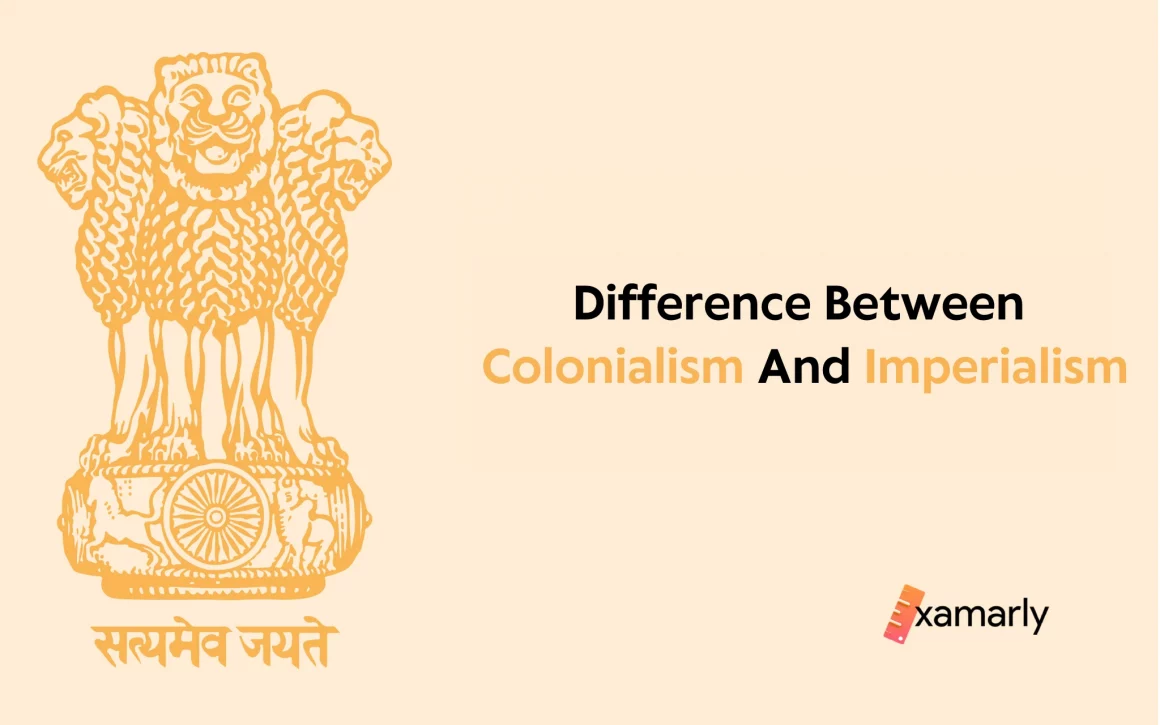Do you want to understand the difference between colonialism and imperialism? Colonialism and imperialism have played a significant role in shaping the world as we know it today.
The term colonialism refers to the process of a powerful country or group of people taking control of a weaker country or territory, often for economic control. Imperialism, on the other hand, refers to the policy or practice of extending a country’s power and influence through colonisation, the use of military domination or other means.
Both colonialism and imperialism have had a profound impact on the people and cultures of the countries that have been subjected to them. In this blog, we will delve into the history of colonialism and imperialism and explore how these practices have shaped our world.
We will examine the causes and consequences of these actions and consider their lasting impact on the global community. Join us as we explore the complex topic of colonialism and imperialism.
- Definition Of Colonialism
- What Are The Important Aspects Of Colonialism?
- Origin Of Colonialism
- Effects Of Colonization
- Examples of Colonialism
- Definition Of Imperialism
- What Are The Important Aspects Of Imperialism?
- Origin Of Imperialism
- Effects Of Imperialism
- Examples Of Imperialism
- Colonialism Vs Imperialism
- Summing Up
- Frequently Asked Questions
- What are the contrasts between imperialism and colonialism?
- How do imperialism and colonialism differ in terms of their impact on the colonized people and their land?
- How are imperialism and colonialism different in terms of their motivations?
- Can a colony exist without imperialism? A: Yes, a colony can exist without imperialism.
Definition Of Colonialism
Colonialism refers to the political and economic domination of one country or region by another. It often involves the settlement of people from the dominant country in the colony, the exploitation of resources, and the imposition of the coloniser’s culture and customs on the native population. Colonial control has had a profound impact on the world, shaping the borders and identities of nations, and affecting the lives of millions of people. It has also led to the forced displacement, exploitation, and cultural erasure of colonised people.
Types of colonialism:
There are several types of colonialism, including economic, political, and cultural colonialism. Economic colonialism involves the control and exploitation of a territory’s resources for the benefit of the colonizing power.
Political colonialism involves the imposition of political control over a territory and its people. Cultural colonialism involves the imposition of the colonizing power’s culture on the colonized people, often leading to the suppression of indigenous cultures.
Additionally, Settler colonialism is a specific type of colonialism in which the colonizers establish themselves permanently in the colony, often leading to displacement and displacement of native populations.
What Are The Important Aspects Of Colonialism?
- Political and economic control of one country or region by another
- Involves the settlement of people from the dominant country in the colony
- Exploitation of resources
- Imposition of the coloniser’s culture and customs on the native population
- Shaped the borders and identities of nations
- Led to forced displacement, exploitation, and cultural erasure of colonised people.
- Economic benefits for the colonising country
- Institution of oppressive laws and systems of governance
- Transferred wealth and resources from the colony to the colonised country.
- Impacted negatively on the colonised population in terms of health, education, and economic opportunities.
- Legacy of colonialism continues to shape global politics and economic relations today.
Origin Of Colonialism
The term “colonialism” comes from the Latin word “Colonia,” which refers to a Roman settlement or colony. The word was first used in the 15th century to describe the process of European nations establishing colonies in the Americas. Over time, the term came to refer to the political and economic domination of one country or region by another, regardless of whether it was a formal colony or not.
In the 19th century, the term colonialism was used to describe the European imperial expansion in Africa, Asia and the Pacific, which brought about economic, political and cultural changes to these regions. Today, the term is used to describe any situation where one country or people exerts political, economic, or cultural control over another.
Effects Of Colonization
- Economic exploitation of colonised regions and peoples, leading to the transfer of wealth and resources from the colony to the colonising country.
- Institution of oppressive laws and systems of governance
- Forced displacement of indigenous populations and loss of traditional lands and resources.
- Cultural erasure, including suppression of native languages, religions, and customs.
- Impacted negatively on the colonised population in terms of health, education, and economic opportunities.
- Creation of artificial borders and boundaries, leading to ethnic and political conflicts.
- Introduction of new diseases, food crops and animals.
- Destruction of indigenous economies and the forced adoption of a cash crop economy.
- The development of racism, discrimination and prejudice towards the colonised population.
- Legacy of colonialism continues to shape global politics and economic relations today.
- In some cases, it can also lead to positive changes such as the introduction of modern technology, education and infrastructure.
It is important to note that the effects of colonialism varied depending on the specific context, and in some cases, the consequences were more severe than others.
Examples of Colonialism
- The colonisation of the Americas by European powers such as Spain, Portugal, France, and England in the 15th and 16th centuries.
- The British colonisation of India, began in the 18th century and lasted until 1947.
- The colonisation of Africa by European powers in the 19th century, led to the partition and colonisation of the continent.
- The colonisation of Australia by the British in the 18th century.
- The colonisation of New Zealand by the British in the 19th century.
- The colonisation of Southeast Asia by European powers, including the Dutch colonisation of Indonesia and the French colonisation of Vietnam.
- The colonisation of the Middle East by European powers, including the British colonisation of Egypt and the French colonisation of Algeria.
- The colonisation of China by Western powers in the 19th century, led to the Opium Wars and the forced opening of China to foreign trade and influence.
- The colonisation of the Pacific Islands by European powers, including the colonisation of Hawaii by the United States.
It is worth noting that colonialism also occurred outside of Europe, such as Japan’s colonisation of Korea and Taiwan, China’s colonisation of Tibet and Inner Mongolia, and Russia’s colonisation of Siberia and Central Asia.
Definition Of Imperialism
Imperialism refers to the policy or practice of acquiring and maintaining control over colonies, territories, or other forms of foreign domination. It is a form of expansionism that involves the extension of a country’s power and influence through military, economic, and political means.
Imperialism can take many forms, such as colonisation, annexation, and hegemony, and it can be driven by a variety of motivations, including economic gain, strategic advantage, and ideological or cultural superiority. Imperialism has played a significant role in shaping world history, leading to the rise and fall of empires, the displacement of peoples, and the creation of new borders and nations.
Types Of Imperialism:
Imperialism refers to the process of one country or nation exerting control over other territories or nations. There are several types of imperialism, including:
- Political imperialism: This form of imperialism is the control or influence of one country over the government or politics of another country.
- Economic imperialism: the control or influence of one country over the economy of another country, often through the exploitation of resources or control of trade.
- Cultural imperialism: the spread of one country’s culture and values to another country, often through the suppression of local cultural practices and traditions.
- Military imperialism: the control or influence of one country over another through military domination.
- Informational imperialism: the control or influence of one country over another through the spread of information and communication technologies.
What Are The Important Aspects Of Imperialism?
- The policy or practice of acquiring and maintaining control over colonies, territories, or other forms of foreign domination.
- A form of expansionism that involves the extension of a country’s power and influence through military, economic, and political means.
- Can take many forms, such as colonisation, annexation, and hegemony.
- Can be driven by a variety of motivations, including economic gain, strategic advantage, and ideological or cultural superiority.
- Has played a significant role in shaping world history, leading to the rise and fall of empires, the displacement of peoples, and the creation of new borders and nations.
- Can lead to the suppression of native cultures and languages.
- Can lead to the exploitation of resources and labour of colonised regions.
- Can result in the forced displacement of indigenous populations.
- Can lead to the imposition of Western institutions, customs and ideas on colonised regions.
- Can result in the subjugation and oppression of colonised peoples.
- Legacy of imperialism continues to shape global politics and economic relations today.
Origin Of Imperialism
The term “imperialism” comes from the Latin word “imperium,” which means “power to command.” The term was first used in the early 19th century to describe the expansionist policies of European nations, particularly the British Empire, which was rapidly acquiring colonies and territories around the world.
The political economist John A. Hobson, in his book “Imperialism: A Study” published in 1902, popularised the term to describe the economic and political expansion of European nations in the late 19th century. In this work, Hobson argued that imperialism was driven by the search for new markets, resources, and strategic advantages, as well as by the desire to spread Western culture and institutions around the world.
Effects Of Imperialism
The effects of imperialism and colonialism are relatively similar. However, there are some severe discriminations pertaining to military orders.
- Economic exploitation: Imperialism leads to the exploitation of resources and labour of colonised regions, resulting in the transfer of wealth from the colony to the colonising country.
- Oppression and subjugation: Imperialism often results in the institution of oppressive laws and systems of governance and the subjugation of colonised peoples.
- Forced displacement: Imperialism can lead to the forced displacement of indigenous populations and the loss of traditional lands and resources.
- Cultural erasure: Imperialism often leads to the suppression of native cultures, languages, and customs, resulting in cultural erasure.
- Negative impact on colonised population: Imperialism has a negative impact on the colonised population in terms of health, education, and economic opportunities.
- Political conflicts: Imperialism often leads to the creation of artificial borders and boundaries, resulting in ethnic and political conflicts.
- Racism and discrimination: Imperialism can lead to the development of racism and discrimination towards the colonised population.
- Environmental degradation: Imperialism can lead to environmental degradation as the colonisers often extract resources without considering the long-term impact.
- Legacy effects: The legacy of imperialism continues to shape global politics and economic relations, often resulting in present-day issues such as poverty, inequality, and political instability.
- Loss of Sovereignty: Imperialism leads to the loss of sovereignty of the colonised countries, where they are forced to follow the laws and policies imposed by the colonisers.
Examples Of Imperialism
- The colonisation of the Americas by European powers in the 15th and 16th centuries.
- The British Empire’s colonisation and control of India, Africa, and other parts of Asia in the 19th and early 20th centuries.
- The colonisation and control of territories in Africa by European powers during the “Scramble for Africa” in the late 19th century.
- The Japanese Empire’s expansion and colonisation of territories in Asia and the Pacific during World War II.
- The United States’ expansion and influence in Latin America, the Philippines, and other parts of the world in the late 19th and early 20th centuries.
- The Soviet Union’s expansion and control of Eastern Europe following World War II.
Colonialism Vs Imperialism
The main difference between colonialism and imperialism is that colonialism involves the settlement of territory and displacement of the indigenous population, while imperialism focuses on exerting control or influence for economic or strategic gain. Colonialism involves direct rule, imperialism is more indirect. Let us look into the similarities and contrasts extensively:
Similarities And Contrasts Between Colonialism And Imperialism
| Similarities | Contrasts |
|---|---|
| Both imperialism and colonialism involve the control or influence of one country or nation over another | Imperialism is generally more focused on exerting control or influence for economic or strategic gain, while colonialism involves the settlement of territory and the displacement of the indigenous population |
| Both imperialism and colonialism have been used to justify the exploitation of resources and labour | Imperialism is often seen as a more recent phenomenon, while colonialism has a long history and is more closely associated with the age of European exploration and conquest |
| Both imperialism and colonialism have had a significant impact on the political, economic, and cultural development of the countries and territories affected | Imperialism is often associated with more indirect forms of control or influence, while colonialism involves the direct rule of a territory or population |
Summing Up
In summary, imperialism and colonialism are terms that describe the political, economic and cultural control of one country over another. Imperialism is mainly focused on exerting control or influence for economic or strategic gain, while colonialism involves the settlement of territory and displacement of the indigenous population. It’s important to understand the distinction between these two concepts to have a better understanding of the history of global power and domination.
Take A Look Into Our Recent Posts
Which Article Is Heart And Soul Of Indian Constitution
Difference Between Secularism And Communalism
Article 371 Of The Indian Constitution
Article 291 Of The Indian Constitution
Frequently Asked Questions
What are the contrasts between imperialism and colonialism?
Imperialism refers to the policy or ideology of extending a country’s power and influence through colonization, the use of military force, or other means. Colonialism refers specifically to the practice of a country setting up and maintaining colonies, particularly in the context of the 15th-19th centuries when European countries established colonies around the world.
How do imperialism and colonialism differ in terms of their impact on the colonized people and their land?
Imperialism and colonialism both had a profound and often negative impact on the colonized people and their land. They were often characterized by forced labour, exploitation of resources, suppression of indigenous cultures and religions, and the imposition of the colonizer’s culture and way of life. In addition, colonialism often resulted in the displacement and loss of land for the indigenous people.
How are imperialism and colonialism different in terms of their motivations?
Imperialism is often driven by a desire for economic gain, military power, or ideological motives such as spreading one’s culture or religion. Colonialism, on the other hand, is the physical act of establishing and maintaining colonies, which is often driven by the same motivations as imperialism.
Can a colony exist without imperialism? A: Yes, a colony can exist without imperialism.
A colony can be established for various reasons such as trade, religious and cultural spread, scientific research, and more. However, in most cases colonization was driven by imperialism.
.






